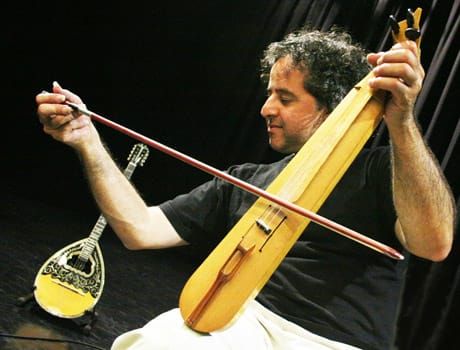One of the most notable trends of the last few years in that ill-defined sector called World Music is acoustic fusion, and Parisian multi-instrumentalist Abaji offers up an intriguing blend of trans-Mediterranean styles on his new disc Origine Orients.
The advantage of applying one's multicultural musical ideas to acoustic instruments is that generally avoids charges of overproduction and too-slick soullessness. Although there is plenty of room for high-concept ideas in acoustic world fusion – witness Albert Kuvezin's Albert Kuvezin's Mongolian throat-sung reinterpretations of Led Zep, Motorhead and Marley, or Tribecastan, which reimagines New York as a fantasyland of global folkloric collisions. Abaji though, takes the unpolished charm of acoustic sources several steps further.
He starts with beat-up stringed instruments from around the Mediterranean, then subjects them to further mods creating toys like the "oud guitar". He recorded each song in one take with no overdubs. Moreover, each performance is full of unorthodox technique: on one track he plays a bamboo flute while simultaneously using it as a slide for a bouzouki and as a drumstick for a Persian hand drum. He draws from five languages and their associated musical traditions: Arabic, Turkish, French, Greek and Armenian. The overall sound is bluesy, haunting, and far from perfectly pitched.
The title track is an austere piece of work featuring the decidedly non-Mediterrean Colombian bamboo sax and some resonating piano strings. The bamboo instrument evokes its distant South East Asian cousins as well as resembling the note-bending on Balkan clarinets. Regardless of provenance, this is an intimate and absorbing tone piece of music.
Listen to Abaji's Origine Orients here.
The advantage of applying one's multicultural musical ideas to acoustic instruments is that generally avoids charges of overproduction and too-slick soullessness. Although there is plenty of room for high-concept ideas in acoustic world fusion – witness Albert Kuvezin's Albert Kuvezin's Mongolian throat-sung reinterpretations of Led Zep, Motorhead and Marley, or Tribecastan, which reimagines New York as a fantasyland of global folkloric collisions. Abaji though, takes the unpolished charm of acoustic sources several steps further.
He starts with beat-up stringed instruments from around the Mediterranean, then subjects them to further mods creating toys like the "oud guitar". He recorded each song in one take with no overdubs. Moreover, each performance is full of unorthodox technique: on one track he plays a bamboo flute while simultaneously using it as a slide for a bouzouki and as a drumstick for a Persian hand drum. He draws from five languages and their associated musical traditions: Arabic, Turkish, French, Greek and Armenian. The overall sound is bluesy, haunting, and far from perfectly pitched.
The title track is an austere piece of work featuring the decidedly non-Mediterrean Colombian bamboo sax and some resonating piano strings. The bamboo instrument evokes its distant South East Asian cousins as well as resembling the note-bending on Balkan clarinets. Regardless of provenance, this is an intimate and absorbing tone piece of music.
Listen to Abaji's Origine Orients here.




